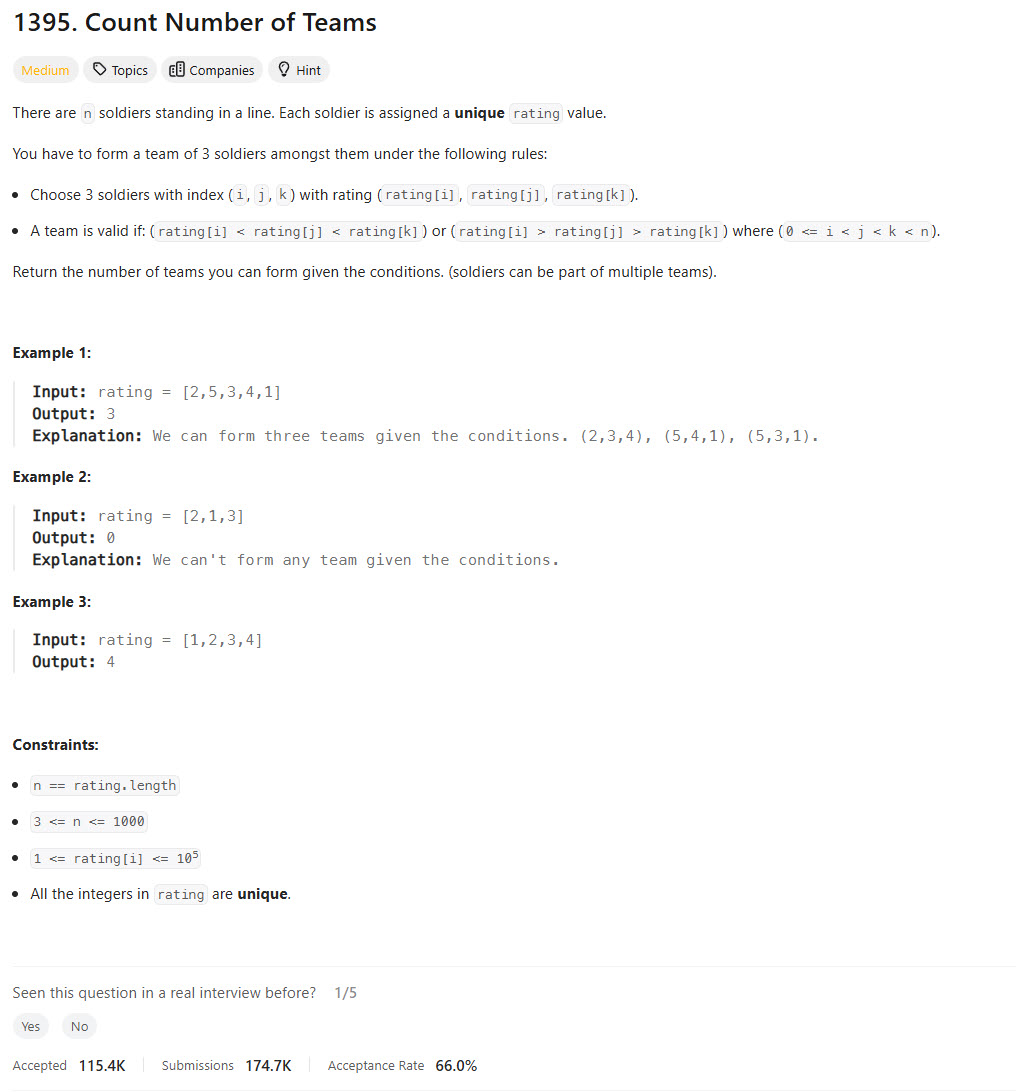Problem of The Day: Count Number of Teams
Problem Statement

Brute Force - TLE
class Solution:
def dfs(self, i, curr, rating, visited, desc=False):
if len(curr) == 3 and curr not in visited:
visited.append(curr[:])
return 1
if i >= len(rating):
return 0
res = 0
for j in range(i, len(rating)):
if desc:
if rating[j] < curr[-1]:
res += self.dfs(j + 1, curr + [rating[j]], rating, visited, desc=True)
else:
if rating[j] > curr[-1]:
res += self.dfs(j + 1, curr + [rating[j]], rating, visited)
return res
def numTeams(self, rating: List[int]) -> int:
N = len(rating)
res = 0
visited = []
for i in range(N):
res += (self.dfs(i, [rating[i]], rating, visited, desc=True) + self.dfs(i, [rating[i]], rating, visited))
return res
Improved Algorithm
Inspired from the Editorial solution, the idea is to use cache to remove the redundant computation for overlapped sub-solution.
class Solution:
def dfs(self, i, curr, rating, visited, size, desc=False):
if size == 3:
return 1
if i >= len(rating):
return 0
if visited[i][size] != -1:
return visited[i][size]
res = 0
for j in range(i, len(rating)):
if desc:
if rating[j] < curr[-1]:
res += self.dfs(j + 1, curr + [rating[j]], rating, visited,size + 1, desc=True)
else:
if rating[j] > curr[-1]:
res += self.dfs(j + 1, curr + [rating[j]], rating, visited, size + 1)
visited[i][size] = res
return res
def numTeams(self, rating: List[int]) -> int:
N = len(rating)
res = 0
asc_cache = [[-1] * 4 for _ in range(N)]
desc_cache = [[-1] * 4 for _ in range(N)]
for i in range(N):
res += (self.dfs(i, [rating[i]], rating, desc_cache, 1, desc=True) + self.dfs(i, [rating[i]], rating, asc_cache, 1))
return res
Editorial
Approach 1: Dynamic Programming (Memoization)
class Solution:
def numTeams(self, rating: List[int]) -> int:
n = len(rating)
teams = 0
increasing_cache = [[-1] * 4 for _ in range(n)]
decreasing_cache = [[-1] * 4 for _ in range(n)]
# Calculate total teams by considering each soldier as a starting point
for start_index in range(n):
teams += self._count_increasing_teams(
rating, start_index, 1, increasing_cache
) + self._count_decreasing_teams(
rating, start_index, 1, decreasing_cache
)
return teams
def _count_increasing_teams(
self,
rating: List[int],
current_index: int,
team_size: int,
increasing_cache: List[List[int]],
) -> int:
n = len(rating)
# Base case: reached end of array
if current_index == n:
return 0
# Base case: found a valid team of size 3
if team_size == 3:
return 1
# Return cached result if available
if increasing_cache[current_index][team_size] != -1:
return increasing_cache[current_index][team_size]
valid_teams = 0
# Recursively count teams with increasing ratings
for next_index in range(current_index + 1, n):
if rating[next_index] > rating[current_index]:
valid_teams += self._count_increasing_teams(
rating, next_index, team_size + 1, increasing_cache
)
# Cache and return the result
increasing_cache[current_index][team_size] = valid_teams
return valid_teams
def _count_decreasing_teams(
self,
rating: List[int],
current_index: int,
team_size: int,
decreasing_cache: List[List[int]],
) -> int:
n = len(rating)
# Base case: reached end of array
if current_index == n:
return 0
# Base case: found a valid team of size 3
if team_size == 3:
return 1
# Return cached result if available
if decreasing_cache[current_index][team_size] != -1:
return decreasing_cache[current_index][team_size]
valid_teams = 0
# Recursively count teams with decreasing ratings
for next_index in range(current_index + 1, n):
if rating[next_index] < rating[current_index]:
valid_teams += self._count_decreasing_teams(
rating, next_index, team_size + 1, decreasing_cache
)
# Cache and return the result
decreasing_cache[current_index][team_size] = valid_teams
return valid_teams
Approach 2: Dynamic Programming (Tabulation)
class Solution:
def numTeams(self, rating: List[int]) -> int:
n = len(rating)
teams = 0
# Tables for increasing and decreasing sequences
increasing_teams = [[0] * 4 for _ in range(n)]
decreasing_teams = [[0] * 4 for _ in range(n)]
# Fill the base cases. (Each soldier is a sequence of length 1)
for i in range(n):
increasing_teams[i][1] = 1
decreasing_teams[i][1] = 1
# Fill the tables
for count in range(2, 4):
for i in range(n):
for j in range(i + 1, n):
if rating[j] > rating[i]:
increasing_teams[j][count] += increasing_teams[i][
count - 1
]
if rating[j] < rating[i]:
decreasing_teams[j][count] += decreasing_teams[i][
count - 1
]
# Sum up the results (All sequences of length 3)
for i in range(n):
teams += increasing_teams[i][3] + decreasing_teams[i][3]
return teams